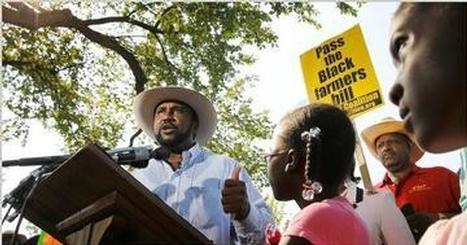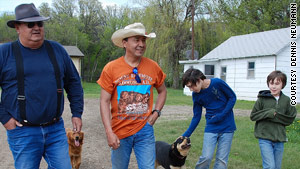
John Boyd, head of the National Black Farmers' Association, campaigns for passage of bill AP Photo Alex Brandon
Black Farmers Bill Passed But Tough Road Still Ahead
by Zenitha Prince
Washington Bureau Chief
Afro-American Newspapers
African Americans are still waiting the “40 acres and a mule” promised them by the U.S. government almost two centuries ago. But, this week, Black farmers took one giant step closer to receiving the payouts due them from the settlement of a discrimination case against the U.S. Department of Agriculture.
On Nov. 30 the U.S. House passed the Claims Resettlement Act by a vote of 256-152, thereby releasing $1.5 billion for restitution to Black farmers that were denied loans or otherwise discriminated against by USDA from 1981-1997.
“It took many years of protests, phone calls, and even a mule ride and a tractor ride for the Black farmers to get the attention and support in Congress that could make today possible,” said John Boyd Jr., president of the National Black Farmers’ Association, Tuesday. “Even though this is not a perfect settlement, it is a just settlement and one that we hope will allow the cases to be resolved and provide closure.”
The Virginia farmer said after almost three decades of pursuing justice in this case, the victory this week was “bittersweet” given the many farmers who lost their farms, lost their livelihoods and lost their lives in the process of waiting.
And the waiting is not quite over for the approximately 65,000 claimants covered in the Pigford II suit, officials say. Black farmers will have to go through an arduous process before they can receive a check, due in part to claims of overspending and fraud from mostly Republican lawmakers.

Native American farmer George Keepseagle with family in North Dakota; they are part of Pigford II suit
“This is an outrage and one vote that no member of this Congress should vote for,” Rep. Michele Bachmann, R-Minn., said in her statement on the House floor, after a recitation of assumptions and figures that she said do not add up. “This will be an albatross around the neck of any Congress member that votes to fund this obviously fraudulent claim.”
Citing the same numbers Iowa Congressman Steve King said, “It’s got to be fraud.” And, he also alleged that near automatic payments of $50,000 and debt relief in the dispersal of Pigford I’s $ 1 billion allotment – without sufficient proof of the claims – is an example of neo-reparations.
“Forty acres and a mule … that’s been the promise of slavery reparations [and] in truth we have the modern-day version of reparations that is going on here … and it is wrong,” he said.
“Rep. King’s comments have a racial undertone against Blacks,” Boyd told the AFRO, adding in other statements, “We’ve proven our case in federal court, we have a settlement agreement, we’ve done everything right in this case.”
Democrat John Conyers, chairman of the Judiciary Committee who has worked on the Black farmers legislation since its inception, dismissed the figures quoted by King and Bachmann as “erroneous conceptions” and added, “I’m a little dismayed that we come back after this recess and after a struggle that has gone on for generations and we come here and of all my colleagues on the other side of the aisle I am stunned that only one person stands in support of a claim that is so gross, so discriminatory.”
Senate Republicans similarly withheld their support of the funding nine times based partly on concerns about overspending and fraud. However, the final measure – passed by unanimous consent last week – contains “a number of steps along the way to guard against … people trying to seek resources that they are not entitled to,” USDA Secretary Tom Vilsack told reporters, Monday.
Among them:
-Claimants must belong to a specific class – Black farmers who missed the original July 1997 deadline for filing a claim under Pigford I and filed sometime after October 1999 and before June 2008.
– Attorneys filing for claimants must furnish a detailed and complete claim form, including a statement affirming – under penalty of perjury – that the claim is legitimate and can be supported with evidence.
-Cases are reviewed by an independent adjudicator, who has the authority to require further documentation and evidence from claimant to further substantiate claim or if fraud is suspected.
– The U.S. comptroller general will evaluate the process – including fraud controls – and submit two reports to Congress.
– USDA’s inspector general will also conduct several performance audits on settled claims.
Additionally, a federal judge has to sign off on the agreement.
Associate Attorney General Tom Perrelli said all in all the final measure protects the government against even more spending – if the litigation were to continue – but also false petitions.
“The bottom line for these cases is we think they’re fair deals for the plaintiffs that we settled with and move us into new chapters at both agencies, but they’re also very fair deals for the taxpayers,” he said.
House Majority Whip James Clyburn, D-S.C., questioned just how fair the process was for Black farmers, however. The former director of the South Carolina Commission for Farm Workers said he was concerned that the powers given to the neutral adjudicator to demand more documentation and to the inspector general to perform audits on resolved claims could inspire “witch hunts” and have a “chilling” effect on Black farmers, who may have rightful demands.
“I want the record to show that these two processes are not found anywhere else [only in reference to Black farmers’ settlement],” he said, later adding, “I don’t want anybody to be unjustly enriched, but I hope that nobody will be intimidated by the process.”
Boyd said making eligible Black farmers familiar and comfortable with the process will take time and considerable outreach from the government. “It’s going to take a while for the trust factor between Black farmers and the USDA [to develop] for us to go into these next steps, so I’m hoping we will be able to work something out about conducting outreach on a national scale to these farmers that are waiting for next steps.”







In 1999 my father’s name was one on the names on the list my mother had just passed and my farther lost his application the very same week as an only child I would like an application so I can file for my father’s part of money due
I WAS TURN DOWN BECAUSE I WAS A BLACK WOMAN IN MY APPLICATION WAS NOT ACCEPT
I WAS TURN DOWN FOR THE BLACK FARMER
i would like information on the application to i too is a granddaughter of of my grandmother and great grandmothers and father’s who was possibly owned by slaves
How can I get a list of who received the Black Farmers Discrimination Litigation Settlement for my family….. Homer and Clara Alexander, Tuskegee, Alabama.
216-408-4893
Henry W Alexander
Cleveland Hts., OH 44118
I would like more information on the process and the false claims from others that reclaim the mind set that African American lie. Why is it that when blacks are to receive adjudication for the murder, rape, and mental abuse on the Negro people generation later, we are referred to a thieves. It is the mind set of these United States that white supremacy must remain and African Americans should understand their role. It is time for laws to change and struggles to be fault. How do I receive the beginning of what is owed to may grandfather and mother while farming in south Georgia
Please forward information about the application. What website? Thank you.
i would like to know how to receive an application and who to contact for more information
How can I get restitution for my parents forty acres and a mule? What is the web site? Who do I contact.
I am the son of Percy Johnson a farmer in Camban Alabama he worked the cotton field from the 1920’s to 1960’s he is now deccased.I missed out on the settlement, can I got more information on obtain restitutions or an application.
I am the granddaughter of a sharecropper from Rosenberg Texas his name was Alfred Neal he is now deceased and so is his daughter whom was my grandmother Jerline Neal who is also deceased can i get more information or an application.
Does land used primarily to grow pine trees on qualify as farming ??? And if so can my father apply
yea how i app 4 resititutions yo this some bullshit why we aint got r sresitition 4 wut whitey put is thru????
Who do we contact to obtain my Restitutions
N Dukes
My mother worked in the cotton field of alabama while she was pregnant with me. My aunts and uncles annd cousins worked the same fields. some of them are still alive. what can be done for them? My mother is deceased but others are still alive.
my great-grand pa was a farmer, he raised corn, peanuts, watermelons, and lots of green vegetables. He worked hard, was honest a decent. The government never helped him. His name is Sylvester Hendrieth. He is deceased now, so is my granny. My daddy is dead too. I would like to get an application.
my great grand parents had farms and cotton farms and cotton fields in the 1930′ s to 1950 . This is how we made a living. As child I worked those fields in Alabama. And we rode wagon’ s into town each month. Somtimes going to banks and markets. I am positive that we were denied loans because some winters words very rough for us. how can I get an application on behalf of my great grandparents. when we were really poor, we were sent to pick cotton on other plantations.
I would like to know where i can get a application. I live in Columbus Georgia
I missed out on the first round of settlement but I would like to apply this time. Where can I find an application either online or elsewhere. I live in Natchez, MS. I couldn’t find any information regarding the application issue anywhere on the Internet. Thanks…